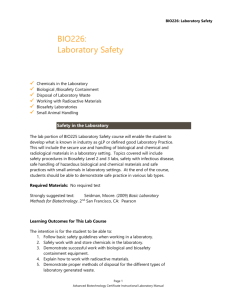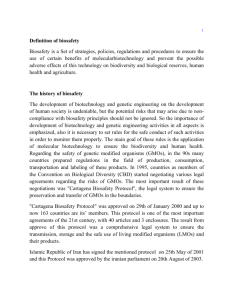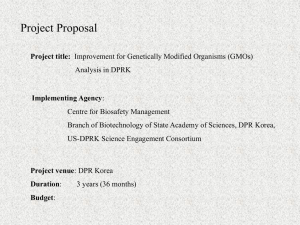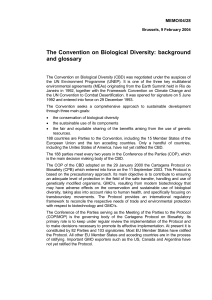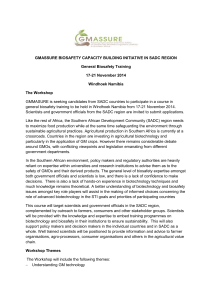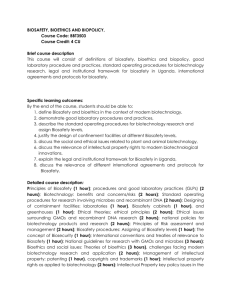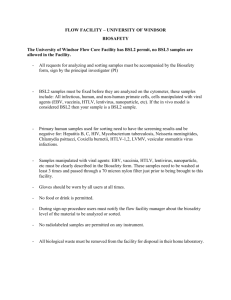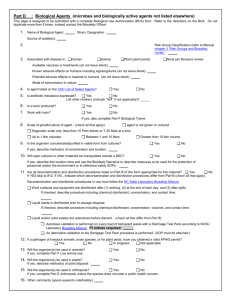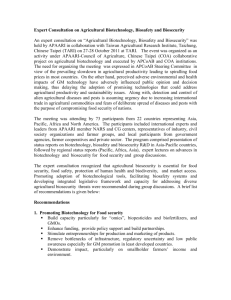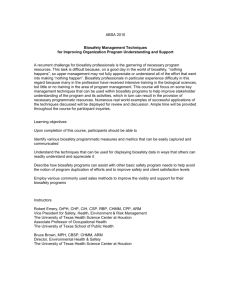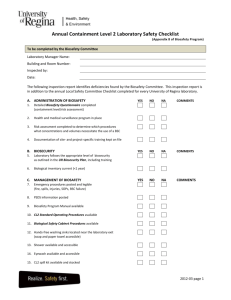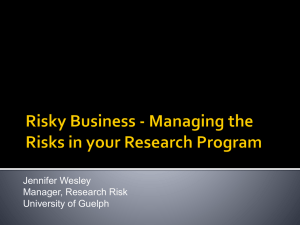Report on the workshop "Biosafety of GMO", Cairo A one day
advertisement
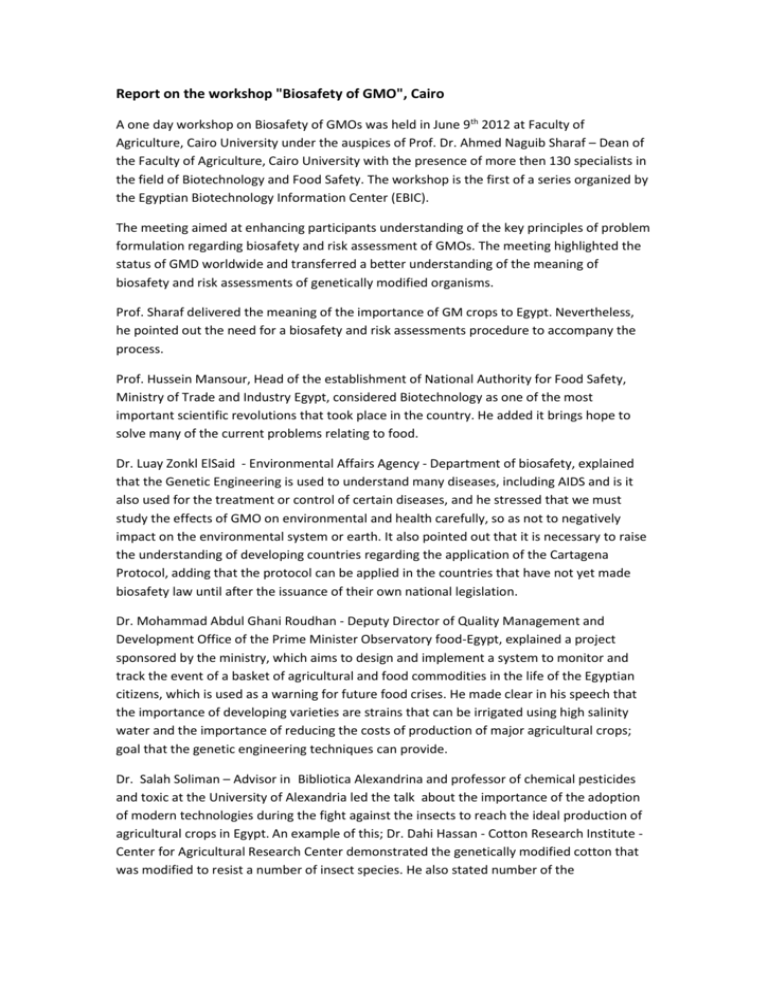
Report on the workshop "Biosafety of GMO", Cairo A one day workshop on Biosafety of GMOs was held in June 9th 2012 at Faculty of Agriculture, Cairo University under the auspices of Prof. Dr. Ahmed Naguib Sharaf – Dean of the Faculty of Agriculture, Cairo University with the presence of more then 130 specialists in the field of Biotechnology and Food Safety. The workshop is the first of a series organized by the Egyptian Biotechnology Information Center (EBIC). The meeting aimed at enhancing participants understanding of the key principles of problem formulation regarding biosafety and risk assessment of GMOs. The meeting highlighted the status of GMD worldwide and transferred a better understanding of the meaning of biosafety and risk assessments of genetically modified organisms. Prof. Sharaf delivered the meaning of the importance of GM crops to Egypt. Nevertheless, he pointed out the need for a biosafety and risk assessments procedure to accompany the process. Prof. Hussein Mansour, Head of the establishment of National Authority for Food Safety, Ministry of Trade and Industry Egypt, considered Biotechnology as one of the most important scientific revolutions that took place in the country. He added it brings hope to solve many of the current problems relating to food. Dr. Luay Zonkl ElSaid - Environmental Affairs Agency - Department of biosafety, explained that the Genetic Engineering is used to understand many diseases, including AIDS and is it also used for the treatment or control of certain diseases, and he stressed that we must study the effects of GMO on environmental and health carefully, so as not to negatively impact on the environmental system or earth. It also pointed out that it is necessary to raise the understanding of developing countries regarding the application of the Cartagena Protocol, adding that the protocol can be applied in the countries that have not yet made biosafety law until after the issuance of their own national legislation. Dr. Mohammad Abdul Ghani Roudhan - Deputy Director of Quality Management and Development Office of the Prime Minister Observatory food-Egypt, explained a project sponsored by the ministry, which aims to design and implement a system to monitor and track the event of a basket of agricultural and food commodities in the life of the Egyptian citizens, which is used as a warning for future food crises. He made clear in his speech that the importance of developing varieties are strains that can be irrigated using high salinity water and the importance of reducing the costs of production of major agricultural crops; goal that the genetic engineering techniques can provide. Dr. Salah Soliman – Advisor in Bibliotica Alexandrina and professor of chemical pesticides and toxic at the University of Alexandria led the talk about the importance of the adoption of modern technologies during the fight against the insects to reach the ideal production of agricultural crops in Egypt. An example of this; Dr. Dahi Hassan - Cotton Research Institute Center for Agricultural Research Center demonstrated the genetically modified cotton that was modified to resist a number of insect species. He also stated number of the environmental issues that would be solved by adopting biotechnology. That includes the rational use of water and soil; the increasing in food security and to reduce poverty. Prof. Abdallah; Director of EBIC, explained that the goal of the workshop is to increase the knowledge regarding GM crops by introducing the negatives and positives associated with the use of biotechnology. She briefed that the goal is to deliver a message; biotechnology is a safe process if we go in the right track; biosafety and risk assessment of GMO. Dr. Ghada Abu Elheba and Dr. Gihan Hussein - Agricultural Research Center - Agricultural Genetic Engineering Research Institute delivered their speech regarding the analysis of scientific techniques for developing genetically engineered plants and explained the potential risks of their use and ways to ensure maximum protection against the potential risks in order to achieve the best productivity. Following the round table discussion; the next recommendations were announced; - - - The application of Biotechnology and the use of genetically modified organisms is no longer an option but a necessary. Transparency between researchers, stakeholders and decision-makers regarding biosafety and risk assessment is needed the correct dissemination of information. The need to raise awareness regarding genetically modified organisms and biosafety among members of the community through media, seminars in schools and public libraries, universities as well as in the rural communities. The need to create and activate the role of Institutional biosafety committees in different universities and research institutes working with biotechnology in vital to ensure the preservation of the environment. Encourage the private sectors to participate in adopting the GMO in the Egyptian agriculture. For more on this workshop visit the EBIC web site www.e-bic.net or contact Dr. Naglaa Abdallah at nabdallah@e-bic.net
